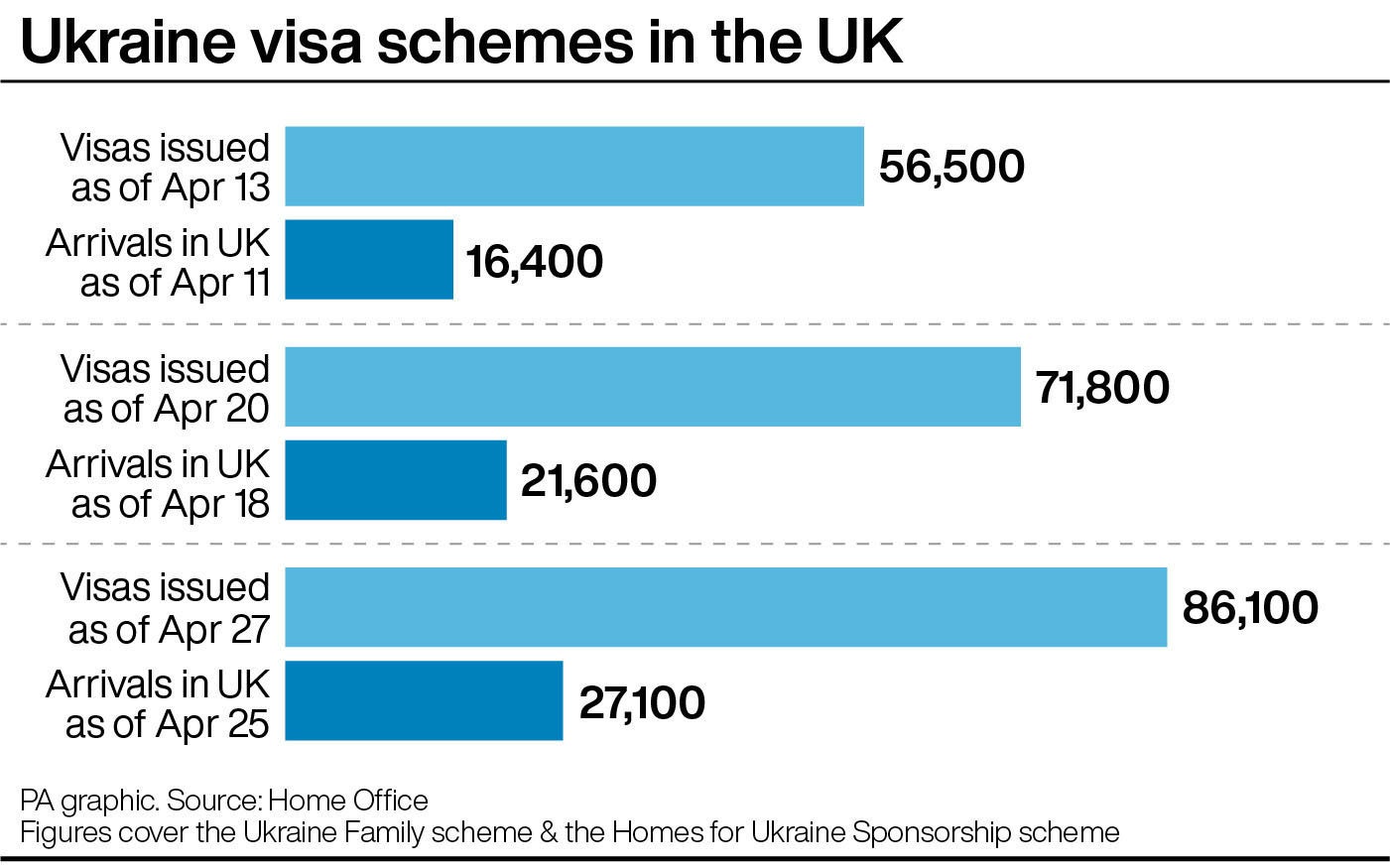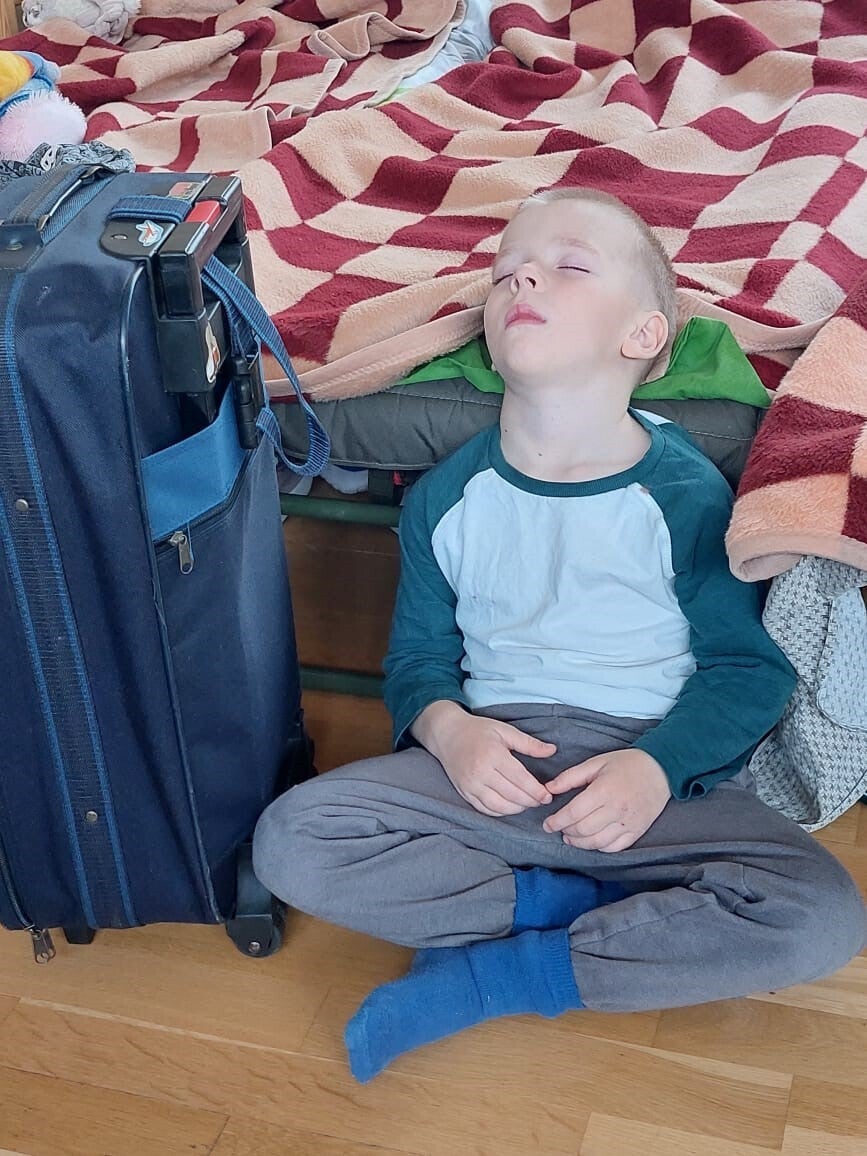
Around a fifth of Ukrainian refugees who have been issued with visas under the Homes for Ukraine scheme have arrived in the UK, Government figures show.
A total of 86,100 visas had been issued as of Wednesday under the Ukraine Family scheme and the Homes for Ukraine Sponsorship scheme, the Government said.
But, as of Monday, just 27,100 Ukrainians had arrived in the UK, according to figures from the Department for Levelling Up, Housing and Communities and the Home Office.

This includes 11,110 people through the sponsorship route – 21.6% of the 51,300 people with visas granted.
Around 16,000 people have arrived under the family scheme – 45.8% of the 34,900 people issued visas.
Overall, less than a third (31.4%) of those granted visas under both schemes have arrived in the UK.
There are multiple cases where families are unable to travel to the UK because not all family members have received their permission to travel letters or visas.
There has also been widespread concern about the length of time it has taken for visas to be issued to refugees under the Homes for Ukraine scheme.
Government officials believe some people applied for visas so they have the option of coming to the UK but are staying in countries bordering Ukraine so they can return home sooner.
Others may have applied but then changed their minds, deciding to stay where they are or travel elsewhere.
It must seem clear to this family that the Government here do not want them to come and the system for applying is disorganised and unhelpful
Home Office minister Kevin Foster said suggestions that Ukrainian children are deliberately not being granted visas to prevent their families from travelling to the UK are “absolute nonsense”.
Speaking on Thursday, Mr Foster admitted that some individuals in family groups “get a decision shortly after others in their party”, adding: “But that is not a deliberate design or policy.”
Overall, around 117,600 visa applications had been received as of Wednesday, including 42,900 under the family scheme and 74,700 under the sponsorship scheme.
Some 68.7% of visa applications made under the Homes for Ukraine scheme have been granted, while the proportion granted under the family route is 81.4%.
Debbie Farnfield, from Marlow, Buckinghamshire, has been waiting for visas since late March for the family of five she is sponsoring who are in Poland.

The parents and two of their children were told earlier this month they could travel to Warsaw to collect their permission to travel documents, but had received no information about their five-year-old son’s application.
However, when they arrived at the visa centre on Wednesday they were told they must all wait at least six weeks from when they got their biometrics done, on March 29.
Ms Farnfield, 68, said she feels “distraught” for the family, who are “very despondent”.
She told the PA news agency: “It must seem clear to this family that the Government here do not want them to come and the system for applying is disorganised and unhelpful.
“How much longer must we, and others like us, apologise to these families being kept waiting in very poor conditions?”
I am so disappointed how our Government are treating people, and to be honest ashamed of being British at the moment, the whole situation is shameful
Jayne Coppinger and her partner are one of five households in Wysall, a village near Nottingham, sponsoring families under the Homes for Ukraine scheme.
The couple helped a mother and her two children in Poland apply over a month ago on March 22.
Kataryna, 37, had her visa approved last week, her son, 14, received confirmation of his application on Monday, but her four-year-old daughter is still waiting.
Ms Coppinger said Kataryna, who has osteoarthritis, was admitted to hospital over the weekend after convulsing and passing out, which she believes is partly stress-related.
She said: “The stress level for the whole family, including father/husband back in Kyiv, is off the scale.
“I am feeling utterly helpless and emotionally exhausted, I am so disappointed how our Government are treating people, and to be honest ashamed of being British at the moment, the whole situation is shameful.”
Katherine Klinger, a would-be host who is holding daily protests outside the Home Office over the delays, said she believes the disparity between Ukrainians arriving and the number of visas issued is largely due to family members receiving visas at different times.
She said: “I know of numerous cases in which a mother is granted a visa but not one of her children – or a child given a visa but not a parent.
“Therefore it appears as if the government is processing the visas fast and achieving high numbers but in effect families due to arrive are actually unable to travel.”
A Government spokeswoman said: “We are processing thousands of visas a day – this shows the changes we made to streamline the service are working and we’ll continue to build on this success so we can speed up the process even further.”







